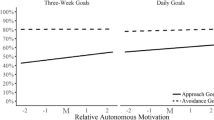Abstract
To test whether forming and memorizing more action plans has larger effects than generating fewer plans. In a randomized controlled trial with five intervention groups and one control group, 478 participants were asked to form one, two, three, four, or five action plans, or to complete questionnaires only (control group). One week later, behavior change was measured and participants of the intervention groups completed a free recall task. Outcome measures are daily intake of fruit and vegetables as well as recall of plans. Fruit and vegetable intake increased with higher numbers of plans, and was significantly larger in groups that formed four (d = 0.36) or five plans (d = 0.48) as compared to controls. The sum of recalled plans reflected the number of generated plans, but was unrelated to behavior change. Generating multiple plans benefits behavior change, but to be implemented they need not be recalled.

Similar content being viewed by others
Notes
An a priori sample size estimation resulted in a sample size of n = 77 participants per condition (d = 0.59; Gollwitzer & Sheeran, 2006; α = .05, power = .95, dropout = 30%).
A PDF-version of the intervention is available upon request from the first author.
Sum of recalled situations divided by the number of plans formed in the respective intervention, see Table 1.
Analyses were run as two-tailed tests in an intention-to-treat framework with missing data being imputed using the EM algorithm (Enders, 2001).
Analyses using data from the longitudinal sample only (n = 362; i.e., excluding dropouts) replicated the differential behavior change across groups, F(5, 354) = 2.48, P = .03.
For comparisons between those who formed 2 and 3 plans, and between those with 4 and 5 plans, P < .05.
References
Chapman, J., Armitage, C. J., & Norman, P. (2009). Comparing implementation intention interventions in relation to young adults’ intake of fruit and vegetables. Psychology & Health, 24, 317–332.
Cohen, A.-L., Jaudas, A., & Gollwitzer, P. M. (2008). Number of cues influence the cost of remembering to remember. Memory & Cognition, 36, 149–156.
Elliott, M. A., & Armitage, C. J. (2006). Effects of implementation intentions on the self-reported frequency of drivers’ compliance with speed limits. Journal of Experimental Psychology: Applied, 12, 108–117.
Godin, G., Sheeran, P., Conner, M., & Germain, M. (2008). Asking questions changes behavior: Mere measurement effects on frequency of blood donation. Health Psychology, 27, 179–184.
Gollwitzer, P. M., & Brandstätter, V. (1997). Implementation intentions and effective goal pursuit. Journal of Personality and Social Psychology, 73, 186–199.
Gollwitzer, P. M., & Sheeran, P. (2006). Implementation intentions and goal achievement: A meta-analysis of effects and processes. Advances in Experimental Social Psychology, 38, 70–110.
Lippke, S., Ziegelmann, J. P., & Schwarzer, R. (2004). Initiation and maintenance of physical exercise: Stage-specific effects of a planning intervention. Research in Sports Medicine, 12, 221–240.
Luszczynska, A., Tryburcy, M., & Schwarzer, R. (2007). Improving fruit and vegetable consumption: A self-efficacy intervention compared to a combined self-efficacy and planning intervention. Health Education Research, 22, 630–638.
Michie, S., Dormandy, E., & Marteau, T. (2004). Increasing screening uptake amongst those intending to be screened: The use of action plans. Patient Education and Counseling, 55, 218–222.
Milne, S., Orbell, S., & Sheeran, P. (2002). Combining motivational and volitional interventions to promote exercise participation: Protection motivation theory and implementation intentions. British Journal of Health Psychology, 7, 163–184.
Morris, S. B., & DeShon, R. P. (2002). Combining effect size estimates in meta-analysis with repeated measures and independent-groups designs. Psychological Methods, 7, 105–125.
Prestwich, A., Perugini, M., & Hurling, R. (2010). Can implementation intentions and text messages promote brisk walking? A randomized trial. Health Psychology, 29, 40–49.
Smith, R. E., & Bayen, U. J. (2004). A multinomial model of event-based prospective memory. Journal of Experimental Psychology. Learning, Memory, and Cognition, 30, 756–777.
Sniehotta, F. F., Schwarzer, R., Scholz, U., & Schüz, B. (2005). Action planning and coping planning for long-term lifestyle change: Theory and assessment. European Journal of Social Psychology, 35, 565–576.
Stadler, G., Gollwitzer, P. M., & Oettingen, G. (2010). Intervention effects of information and self-regulation on eating fruits and vegetables over 2 years. Health Psychology, 29, 274–283.
Steptoe, A., Perkins-Porras, L., McKay, C., Rink, E., Hilton, S., & Cappuccio, F. P. (2003). Psychological factors associated with fruit and vegetable intake and with biomarkers in adults from a low-income neighborhood. Health Psychology, 22, 148–155.
van Osch, L., Lechner, L., Reubsaet, A., & de Vries, H. (2010). From theory to practice: An explorative study into the instrumentality and specificity of implementation intentions. Psychology & Health, 25, 351–364.
Webb, T. L. (2006). Getting things done: Self-regulatory processes in goal pursuit. Social Psychological Review, 8, 2–13.
Wiedemann, A. U., Lippke, S., Reuter, T., Ziegelmann, J. P., & Schüz, B. (2011a). The more the better? The number of plans predicts health behaviour. Applied Psychology: Health and Well-Being, 3, 87–106.
Wiedemann, A. U., Lippke, S., Reuter, T., Ziegelmann, J. P., & Schwarzer, R. (2011b). How planning facilitates behaviour change: Additive and interactive effects of a randomized controlled trial. European Journal of Social Psychology, 41, 42–51.
World Health Organization. (2003). Diet, nutrition and the prevention of chronic diseases: WHO technical report (Vol. 916). Geneva: WHO.
Acknowledgment
The authors would like to thank Jana Richert and Milena Koring for their help in conducting this study.
Author information
Authors and Affiliations
Corresponding author
Electronic supplementary material
Below is the link to the electronic supplementary material.
Rights and permissions
About this article
Cite this article
Wiedemann, A.U., Lippke, S. & Schwarzer, R. Multiple plans and memory performance: results of a randomized controlled trial targeting fruit and vegetable intake. J Behav Med 35, 387–392 (2012). https://doi.org/10.1007/s10865-011-9364-2
Received:
Accepted:
Published:
Issue Date:
DOI: https://doi.org/10.1007/s10865-011-9364-2




